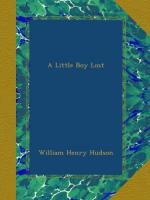[Illustration: ]
CHAPTER II
THE SPOONBILL AND THE CLOUD
As Martin grew in years and strength, his age being now about seven, his rambles began to extend beyond the waste grounds outside of the fenced orchard and gate. These waste grounds were a wilderness of weeds: here were the sunflowers that Martin liked best; the wild cock’s-comb, flaunting great crimson tufts; the yellow flowering mustard, taller than the tallest man; giant thistle, and wild pumpkin with spotted leaves; the huge hairy fox-gloves with yellow bells; feathery fennel, and the big grey-green thorn-apples, with prickly burs full of bright red seed, and long white wax-like flowers, that bloomed only in the evening. He could never get high enough on anything to see over the tops of these plants; but at last he found his way through them, and discovered on their further side a wide grassy plain with scarcely a tree on it, stretching away into the blue distance. On this vast plain he gazed with wonderment and delight. Behind the orchard and weedy waste the ground sloped down to a stream of running water, full of tall rushes with dark green polished stems, and yellow water-lilies. All along the moist banks grew other flowers that were never seen in the dry ground above—the blue star, and scarlet and white verbenas; and sweet-peas of all colours; and the delicate red vinegar flower, and angel’s hair, and the small fragrant lilies called Mary’s-tears, and tall scattered flags, flaunting their yellow blossoms high above the meadow grass.
Every day Martin ran down to the stream to gather flowers and shells; for many curious water-snails were found there with brown purple-striped shells; and he also liked to watch the small birds that build their nests in the rushes.
There were three of these small birds that did not appear to know that Martin loved them; for no sooner would he present himself at the stream than forth they would flutter in a great state of mind. One, the prettiest, was a tiny, green-backed little creature, with a crimson crest and a velvet-black band across a bright yellow breast: this one had a soft, low, complaining voice, clear as a silver bell. The second was a brisk little grey and black fellow, with a loud, indignant chuck, and a broad tail which he incessantly opened and shut, like a Spanish lady playing with her fan.
The third was a shy, mysterious little brown bird, peering out of the clustering leaves, and making a sound like the soft ticking of a clock. They were like three little men, an Italian, a Dutchman, and a Hindoo, talking together, each in his own language, and yet well able to understand each other. Martin could not make out what they said, but suspected that they were talking about him; and he feared that their remarks were not always of a friendly nature.




